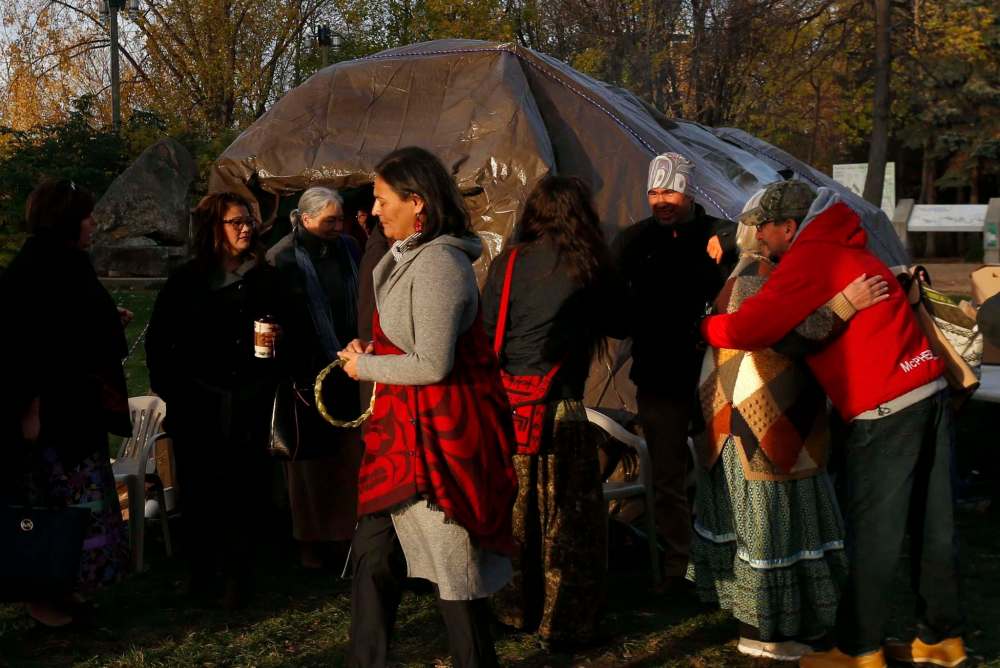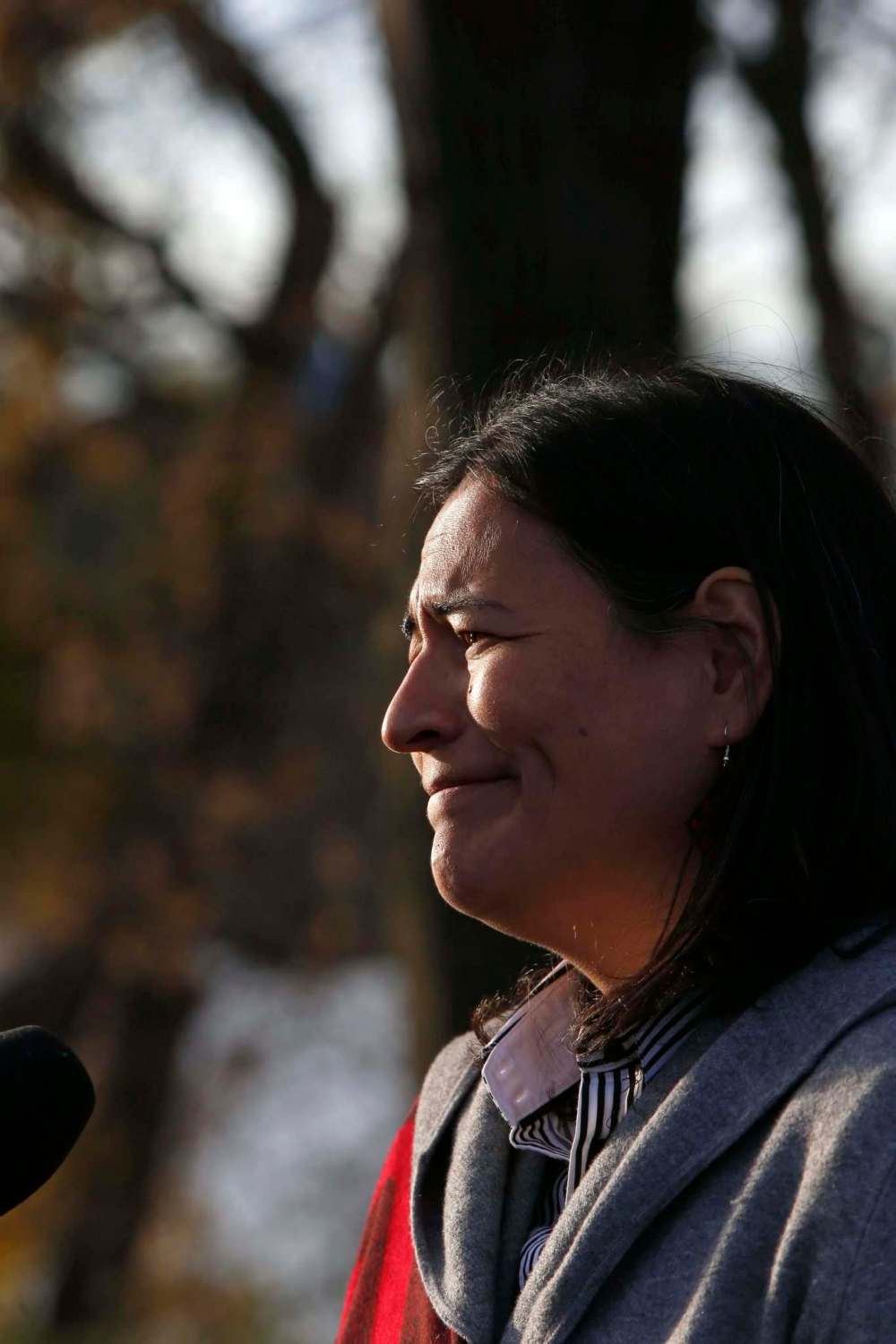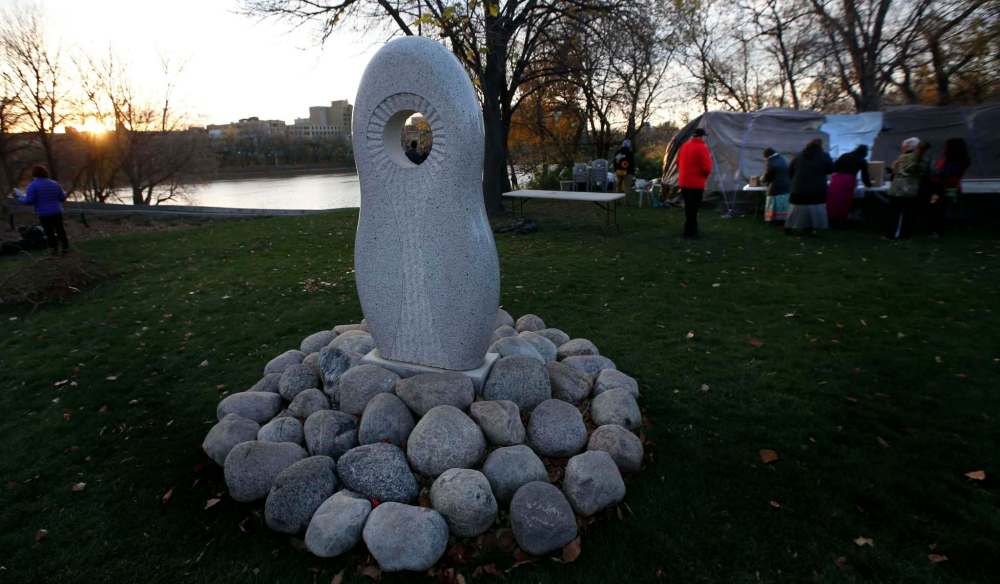MMIW inquiry begins week of hearings in city with daybreak ceremonies
Advertisement
Read this article for free:
or
Already have an account? Log in here »
To continue reading, please subscribe:
Monthly Digital Subscription
$0 for the first 4 weeks*
- Enjoy unlimited reading on winnipegfreepress.com
- Read the E-Edition, our digital replica newspaper
- Access News Break, our award-winning app
- Play interactive puzzles
*No charge for 4 weeks then price increases to the regular rate of $19.00 plus GST every four weeks. Offer available to new and qualified returning subscribers only. Cancel any time.
Monthly Digital Subscription
$4.75/week*
- Enjoy unlimited reading on winnipegfreepress.com
- Read the E-Edition, our digital replica newspaper
- Access News Break, our award-winning app
- Play interactive puzzles
*Billed as $19 plus GST every four weeks. Cancel any time.
To continue reading, please subscribe:
Add Free Press access to your Brandon Sun subscription for only an additional
$1 for the first 4 weeks*
*Your next subscription payment will increase by $1.00 and you will be charged $16.99 plus GST for four weeks. After four weeks, your payment will increase to $23.99 plus GST every four weeks.
Read unlimited articles for free today:
or
Already have an account? Log in here »
Hey there, time traveller!
This article was published 16/10/2017 (2979 days ago), so information in it may no longer be current.
Sorrow, anger and song marked the testimony from families Monday at the start of five days of hearings in Winnipeg for the National Inquiry into Missing and Murdered Indigenous Women and Girls.
“The reason I’m here is to pick up where my sister left off, to tell Nicole’s story so people know she isn’t just a statistic, that she was loved and that she came from a good family,” Joan Winning told the commission.
Winning — the aunt of Nicole Ashley Daniels, 16, who was found frozen to death behind an auto body shop on Regent Avenue in 2009 — led the first of four families to offer testimony. The relatives were often weeping as they spoke, all of them visibly angry at authorities and blaming them for dismissing concerns when their relatives went missing.

Winning and her daughter, Isabel Daniels Winning, used harsh words as they flatly dismissed official accounts that Nicole died of hypothermia. They called on authorities to reopen the investigation.“You ask if we have any suggestions? Look at us, the same way white people look at themselves. That’s all we ask. These girls were intelligent. They could have had success in life. We come from a good family. My sons all have university degrees. They all work. My mother raised 15 children and when she finished that, she went back to school to become a nurse. In her 40s.” –Paul Daniels, elder for the family of Nicole Ashley Daniels, 16. Nicole was found facedown in a snow bank near Regent Avenue in Winnipeg in 2009, the morning after meeting up with a stranger she met on a chat line. Police closed the case, after an autopsy ruling determined the death was from hypothermia .
“The way Nicole was found, frozen, in a dark place and the circumstances leading to her death, I believe were the actions of one person, the person who took her, supplied her with alcohol so she couldn’t walk… And when he finished with her, he tossed her out and left her there,” Winning said.
“We need to focus on why these predators are picking on our women and why we are all disposable people, otherwise there will be more Nicoles,” Isabel Daniels Winning said, adding police told the family during the investigation they had spoken to a 45-year-old Transcona man believed to have lured Daniels online, the night before her death.
“He disposed of her like she was garbage… (Yet) the police said this man is an upstanding member of society. Well, what the hell was she? I think it’s bull—-,” she said bitterly.
The pair painted a portrait of a girl from the projects whose family was poor but closely knit; Nicole was a budding artist, the oldest of six whose death destroyed the family and drove her mother to an early grave.
A family friend sang a song he composed as a tribute, accompanying the lyrics with guitar: “When you were young, you were here / Now all we have is goodbye / All that is left is memories / It’s a weight we can not bear.”
More than 75 Indigenous families from southern Manitoba are registered to testify at the Winnipeg hearings, some in public, others in private during the five-day stop. There were pleas for the inquiry to also schedule hearings in Thompson for northern families.
The inquiry moves on to Saskatoon for another set of hearings next month. It ends the year with meetings in Nunavut in December. Teams are to be sent out in coming months to remote and rural First Nations to take testimony in mini-hearings starting in a few weeks.

The Winnipeg hearings opened Monday with a sunrise ceremony at The Forks and carried on at the downtown Radisson hotel with speeches, drum songs and prayers before families started their testimony in the afternoon.
In one extraordinary session, members of the families of three women found brutally murdered, decades apart, testified as one group.
Jennifer Johnson was killed in an attack in her home, while her sister and her sister’s children slept just metres away in 1980. In 2013, Johnson’s niece, named for her slain aunt, was strangled and dismembered.
Jennifer McPherson’s husband, Traigo Andretti, was convicted of first-degree murder after McPherson’s remains were found scattered on remote Hanson Island, B.C.
After he was handed a life sentence, Andretti admitted to having slain another woman, Myrna Letandre, 36, strangling and dismembering her, shockingly burying her head in a crawl space beneath a Point Douglas rooming house in 2006.
Betty Rourke — McPherson’s mother and the sister of Jennifer Johnson — said in both cases, the men had histories of violence against women and they might still be alive had those men had been behind bars.“The police bulletin described Jennifer as Caucasian and I told my mother they might not look for her if they knew she was Aboriginal. We thought nobody would take her (disappearance) seriously, if they thought she was Aboriginal. We know how society looks at Aboriginal women. That they go missing. So we made a conscious decision not to correct (the police bulletin).” –Kim McPherson, sister of Jennifer McPherson, 41. Her remains were found on remote Hanson Island, B.C., in 2013. Her husband, Traigo Andretti, was given a life sentence for first-degree murder in the slaying. He was also later convicted of second-degree murder in the death of Myrna Letandre, 36. Letandre’s remains were found hidden in the basement crawl space of a rooming house in Point Douglas. Andretti strangled and dismembered both women, who had been long-time Winnipeg residents
Incredibly, it was the families who led the investigation in her daughter’s death, Rourke said. Andretti’s mother — in a series of Facebook messages between the two mothers — took the initiative to go to the remote island, find her son, get an account from him and call police to investigate.
“She told me everything that happened. Then the RCMP called me and started to investigate,” Rourke testified.

“This man was a vile, evil being and had there been a thorough investigation, he wouldn’t have taken lives, from my family and theirs, also,” said Letandre’s sister, Lorna Sinclair.
“I have a lot of guilt inside of me because I didn’t do more. I did the best I could,” Sinclair said, recounting repeated calls alerting police to her sister’s disappearance. It would be seven years before the family saw justice at Andretti’s trial.
“I know the cops should have done more. More needs to be done when our people go missing.”
The families of all three slain women are expected to continue testimony today.
alexandra.paul@fresspress.mb.ca
History
Updated on Monday, October 16, 2017 7:18 PM CDT: Comments turned off.
Updated on Monday, October 16, 2017 8:12 PM CDT: Updated.
Updated on Monday, October 16, 2017 10:36 PM CDT: Edited
Updated on Monday, October 16, 2017 11:16 PM CDT: Typo fixed


